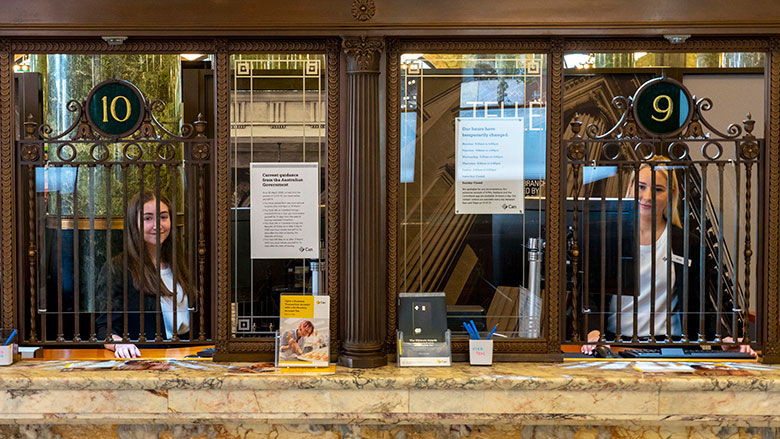A hundred years on from the Spanish Flu, Commonwealth Bank found itself once again playing a vital role in providing support to Australians during a global pandemic. Here, Holly Pascoe takes a look at the bank's response to the coronavirus and how our people have supported our customers.
It's Saturday, 25 January 2020, the first day of the Australia Day long weekend. Amidst the celebrations, a media release emerges quietly from the health minister's office in Canberra. It was news that within two months would spark a full-blown health crisis and a dramatic lockdown of the Australian economy.
The significance of its contents are almost lost: Australia has its first confirmed human case of the coronavirus. The country is about to be plunged into its first health pandemic in 100 years.
The day before, Commonwealth Bank's employees at offices around the country and across the Group's 900 strong branch network were looking forward to taking a short break from dealing with the summer's devastating bushfires. The fires still had two weeks to run.
It was an eerie prelude to the coronavirus. Whole regions in New South Wales and Victoria had been locked down and evacuated. Recovery programs were getting underway, including CBA's announcement of a $10 million Bushfire Recovery Grants program aimed at helping local communities to rebuild destroyed and damaged facilities.
The smoke from the fires was still lingering heavily in the air across Australia when Canberra made its coronavirus announcement. China had already indicated the seriousness of the situation by shutting off the city of Wuhan, where the virus had originated, from the outside world.
In Sydney, the Bank's Business Resilience team quietly activated its First Response Team to begin the planning and co-ordination for the potential impact of the coronavirus on the Group.
Fast forward to April, and the full force of the virus on the global economy has been staggering. Like many other countries, Australia's has effectively been put into hibernation as whole swathes of industries and companies shut down. The impact on people has been devastating.
Social distancing and movement restrictions has left hardly any business unaffected. Some have been lucky, quickly adapting the way they deliver their products and services. But for the vast majority, life has taken a dramatic turn for the worst. From local cafes to the larger end of town, the floor has fallen from underneath them.
With a large number of Australians either losing their jobs or being stood down by their employers - losing in the process the security of their incomes - many households continue to face an uncertain future.
For CBA's Chief Executive Matt Comyn, the course of action has been clear - an unprecedented crisis required an unprecedented response. It needed to be quick and it needed a level of co-operation and collaboration across government, regulators, banks and people that hadn't occurred since World War 2.
Faced with a health and economic crisis not seen since the Spanish Flu pandemic of 1918-1920 - a 100 year-old event with uncanny parallels for the bank and its response now - Mr Comyn told CBA's 45,000 staff that we had to come together as a nation to combat the serious and wide-ranging risks posed by the coronavirus.
"We will ensure that people can get paid, that small businesses can keep operating, and that we can provide access to emergency funds when needed," he said. "These are just a few of the many vital transactions that we will continue to make happen. This is what our purpose of improving the financial wellbeing of our customers and communities is all about."

Like the pandemic at the end of World War I, banking was declared an essential service by the Government early on in this current crisis.
Almost immediately, the phones began to ring off the hook at our Australian-based call centres with the teams who usually took a few hundred calls a day from customers experiencing financial hardship dealing with up to eight times that number.
Pressures on teams have been enormous. Employees across the bank, in particular frontline staff in branches, have been called upon to support them and deal with hundreds of thousands of requests from customers for help and advice.






